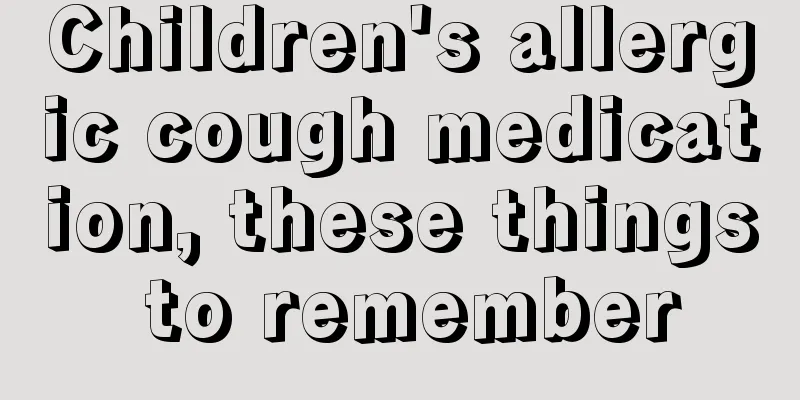What causes tooth decay in children? 3 major reasons to be vigilant!

|
If a child suffers from tooth decay, the harm is very serious. First of all, it will affect the child's normal development, because the teeth are very painful, which will affect the child's eating. In addition, the chewing ability is reduced, and the food is swallowed without being fully chewed, which will affect digestion. Severe cases will lead to malnutrition. Children with tooth decay may also develop some infectious diseases. 1. Bacteria During the occurrence and development of dental caries, bacteria play a leading role in the onset of dental caries. Therefore, in recent years, it has been internationally recognized that dental caries is a bacterial disease. There are many types of bacteria that cause dental caries, the most important of which are certain mutans streptococci and lactobacilli. These bacteria mix with mucin and food debris in saliva and adhere firmly to the tooth surface and pits and fissures. This adhesive substance is called dental plaque or dental plaque. The large number of bacteria in the plaque produce acid, causing the enamel surface under the plaque to decalcify and dissolve. Clinical investigations have shown that children with more plaque in their mouths tend to have more dental caries. 2. Diet Diet is an important factor for bacteria in the formation of dental caries. Food contains a large amount of carbohydrates and sugars, which not only provide energy for the life and activity of bacteria in plaque, but also produce organic acids through bacterial metabolism. The acids remain on the tooth surface and in pits and fissures for a long time, causing demineralization and destruction of enamel. Subsequently, some bacteria dissolve proteins to form cavities. There are many caries-causing sugars, the most important of which is sucrose. During the period of tooth development, nutrition determines the biochemical structure of tooth tissue, and well-calcified teeth have high caries resistance. If the food contains insufficient mineral salts, main vitamins and trace elements, such as calcium, phosphorus, vitamin B1, D and fluoride, the teeth's resistance to caries will be low, creating the conditions for the onset of caries. Deciduous teeth occur, develop and calcify during the fetal period. Although the mother's nutrition during the lactation period does not have a decisive influence on the development of fetal deciduous teeth, strengthening maternal nutrition is still beneficial to the calcification of deciduous teeth. Unless the mother suffers from severe metabolic disorders or genetic diseases, deciduous teeth are generally not seriously affected. 3. Teeth The morphology, structure and position of teeth have a significant relationship with the incidence of dental caries. The pits and fissures on the biting surface of teeth are defects left over from the development process. Cells and food debris are easily retained in deep pits and fissures, and are difficult to remove, which can easily induce tooth decay. Teeth with insufficient mineralization, especially insufficient calcification, have low density of enamel and dentin, low caries resistance, and are prone to caries. Although the content of fluoride in the mineralized structure of teeth is very small, it is very important for enhancing the caries resistance of teeth. If teeth contain an appropriate amount of fluoride, tooth decay is less likely to occur. The structure and calcification of deciduous teeth and young permanent teeth are not mature enough, so they are easily affected by caries factors and have a high caries rate. Saliva is the external environment of teeth, playing the role of buffering, washing, anti-staining or antibacterial. Large amounts of dilute saliva can clean the surface of teeth and reduce the accumulation of bacteria and food debris. Small amounts of thick saliva tend to accumulate, promoting plaque formation and adhesion on the tooth surface. The properties and composition of saliva affect its buffering capacity and also affect the living conditions of bacteria. |
<<: What should we pay attention to when it comes to children’s vaccinations?
>>: What are the clinical manifestations of abdominal pain in children?
Recommend
What should I do if my child has asthma-related pneumonia?
Pneumonia is also relatively common in our lives....
What to do if your baby has phlegm
We will find that many children always clear thei...
Why does my child sit up when sleeping at night?
In life, many children will suddenly sit up durin...
Is it normal for a newborn baby to have a temperature of 37 degrees?
Since body temperature plays an important role in...
What to do if your child has a recurring fever? Treatment of fever in children
Children are more likely to get sick during the t...
What are the precautions for newborn hearing test?
The hearing test of newborns has always been a sp...
What age is calcium and zinc suitable for children?
During the growth and development of children, ma...
Peeling skin on child's hands
Children's skin is very delicate and generall...
Can children drink brown sugar water? Do you know that brown sugar has the effect of nourishing the stomach?
I believe everyone has the experience of drinking...
What should I pay attention to when my child has watery beans?
Chickenpox is a common disease in children during...
What disease will a child develop when he is forced to cut his palm?
In life, when many children are sick, doctors wil...
What to do if your child has dry and itchy skin
Dry and itchy skin in children is likely due to u...
How to remove dental plaque from children
Dental plaque in children is a relatively common ...
Dietary considerations for children with precocious puberty
Nowadays, many foods on the market contain hormon...
What materials are good for children's dental fillings?
There are actually quite a lot of materials that ...









